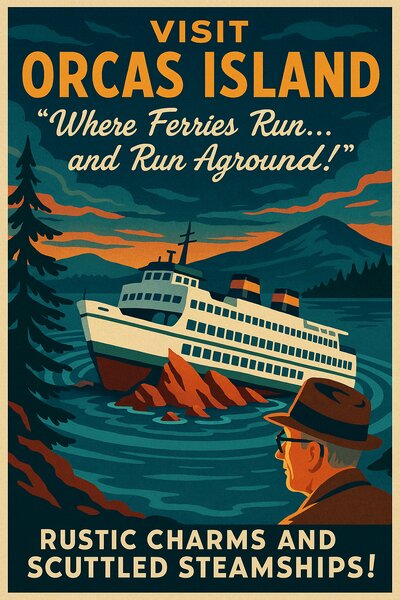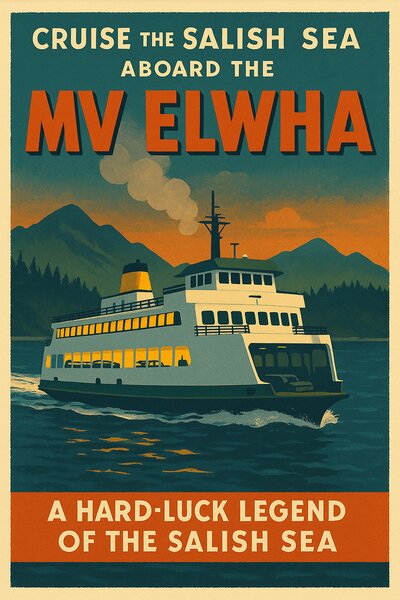She was launched in 1967 with a clean white hull, room for 144 cars, and an optimistic mission: to serve the people of Washington with dignity, regularity, and perhaps even a touch of grace. Her name was Elwha, taken from a river on the Olympic Peninsula that had, for millennia, cut its way through cedar and stone. In 2011, that river began flowing freely for the first time in over a century, following the largest dam removal project in U.S. history. Concrete gave way to current; salmon returned to ancestral headwaters. And just as the river reclaimed its natural rhythm, the ferry that bore its name reached the end of its long, battered run. One restored, one retired—each returned, in its own way, to history.
But while the dam stymied the fish, the ferry Elwha strained the patience of an entire county—who, like many long-suffering dependents, came to love her in spite of herself. She did not glide smoothly through her career. She would grind, scrape, veer, dent, drift, and collide her way into infamy—and still be loved for it.
Early Years and a Restless Role
The MV Elwha was the last of the Super-class ferries built for Washington State Ferries in the 1960s, and she spent her first years crossing Puget Sound between Seattle and Bainbridge Island. There was a hopeful air about her. She was fast, stable, and modern. At 382 feet long, she could carry a town's worth of vehicles and a small city's worth of foot passengers. But early on, the Elwha established a reputation—not as the fleet's pride, but as its scrappy utility player. She was the relief pitcher, sent in whenever another ferry broke down. It didn't take long for her to start breaking down, too.
The San Juans and a Shift in Fate
By the 1980s, Elwha had found her calling in the San Juan Islands, shuttling travelers between Anacortes, Friday Harbor, Orcas, Lopez, and Sidney, British Columbia. She was outfitted to meet international maritime standards and spent much of her life on the only WSF route that crossed the border. It should've been a plum assignment—a scenic route through forested islands and postcard channels—but instead, it became a saga.

The MV Elwha ferry during her years serving the San Juan Islands route, carrying passengers through the beautiful waters of the Salish Sea.
The defining moment came on October 2, 1983. Captain Billy Fittro, navigating near Orcas Island, reportedly diverted from the standard route to give a friend a closer view of her waterfront home. The Elwha, all 2,800 tons of her, plowed into a submerged reef in Grindstone Harbor. Passengers heard the crunch. The ship limped back to port, gashed below the waterline. Initial reports blamed a mechanical issue. But within days, the truth emerged. The detour had been unauthorized, and the grounding, fully avoidable. Fittro resigned before he could be fired. The reef, until then anonymous, was later named Elwha Rock.
Locals, not known to let a good joke go unmilked, wrote a Dixieland jazz song titled "Elwha on the Rocks," which got actual radio play. An Orcas bar served a cocktail of the same name, with extra rum and a cherry on top. Small wooden ferries glued to actual rocks became tongue-in-cheek souvenirs. Even the passenger at the center of the detour earned a nickname: the Siren of the San Juans.
A String of Battered Years
After the 1983 grounding, Elwha seemed to embrace her role as the fleet's misadventure magnet. She broke loose from her moorings during a December 1990 windstorm and slammed into a concrete pier. In 1994, she drifted in fog and crashed into the Anacortes ferry terminal, wrecking the passenger walkway. Then in 1996, her captain chose to take an off-route shortcut near Cattle Point, ran aground again, and later failed a drug test. He was fired. Elwha was patched up—again—and returned to service.
Then in 1999, she delivered one of her most memorable blows: a full-speed collision with the Orcas Island dock that rendered it inoperable for weeks. A software malfunction prevented the engines from reversing properly, and the Elwha slammed into the pilings, splintering the wooden structure and disabling ferry service to the entire island. Orcas residents were cut off from the mainland, and for a time, only emergency boats and airlifts could bring people or supplies to and from the island. It was, by all accounts, a logistical nightmare—and yet another badge on Elwha's well-worn hull.
Weathered but Beloved
The ship developed a kind of resigned charisma. Like a well-worn axe that split more boots than firewood, she kept showing up. Despite her troubles, the Elwha was never blamed by islanders. It was always the conditions, the crews, the fog, the software, the dock design. In fact, many captains and deckhands considered her a rewarding vessel to sail—responsive, reliable, and sturdy, when treated right.
She carried on for decades, mostly in the San Juans, often as the sole ferry capable of the Anacortes–Sidney international route. But age caught up. By the 2010s, the Elwha was requiring extensive steel repairs—dozens of square feet of corroded hull plating replaced at great cost. In 2018, more than 12,000 square feet of steel had to be removed and replaced from her passenger deck, in a repair effort that lasted months and cost more than $20 million.

The weathered MV Elwha at dock, showing the wear and tear from decades of faithful service to the San Juan Islands community.
That might have been her last hurrah. By 2019, another round of decay was discovered. This time, the bill was closer to $35 million. When Washington voters approved a statewide tax-limiting measure, WSF didn't have the budget. Elwha was retired. Her international route was suspended. San Juan businesses, especially those that benefited from Canadian tourism, mourned her exit.
End of the Line—and a New Beginning
In 2024, she was sold for scrap and towed—briefly—out of Elliott Bay. The tug malfunctioned, the trip was aborted, and she returned in ignominy. Worse, the foreign crew of the tug was allegedly left unpaid and adrift in Puget Sound until Customs intervened. The state canceled the sale.
Then came the twist: Everett Ship Repair, a marine company on the Snohomish River, bought the Elwha in early 2025. She was towed north, not to be dismantled, but to serve as a floating office and warehouse. A second life—not at sea, but still near the water.
It's hard not to smile. For all her troubles—the software failures, the foggy collisions, the unfortunate rock—Elwha earned her place in local lore. She carried millions safely, gave a generation of island kids their first taste of adventure, and once spent a summer stranded with a Volvo onboard because the driver forgot to get back on.
"Some vessels retire in dignity. Others, like Elwha, retire in legend. And if she leaks a little? That's just part of the charm."